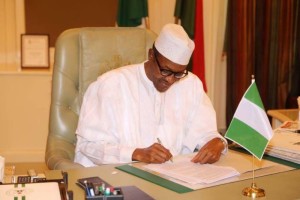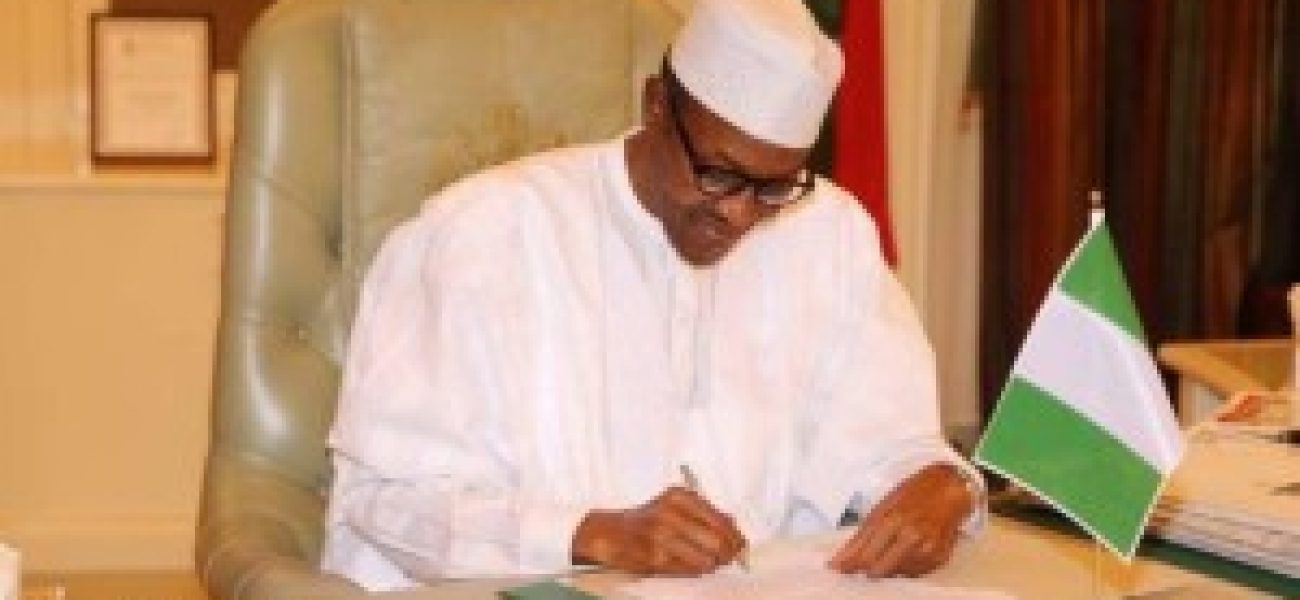 As of July 17th 2018, President Buhari has assented to 5 of the 12 Constitution Alteration Bills that were transmitted by the National Assembly after its passage and subsequent adoption by at least 24 State Houses of Assembly.
As of July 17th 2018, President Buhari has assented to 5 of the 12 Constitution Alteration Bills that were transmitted by the National Assembly after its passage and subsequent adoption by at least 24 State Houses of Assembly.
The Constitution Alteration Bills assented to so far, seek to strengthen the legislative arm, the electoral process and inclusion. They include:
- A Bill seeking Financial Autonomy of State Legislatures
- A Bill on Political and Electoral Matters
- A Bill on Determination of Pre-Election Matters
- A Bill Restricting the Tenure of President or Governor and;
- A Bill on Reduction of Age for Elective Offices
The newly passed Bill seeking the financial autonomy of State legislatures strengthens the financial autonomy of the State Houses of Assembly by guaranteeing their independence from Governors by providing for their funding directly from the Consolidated Revenue Fund of the State [7]. Under extant provisions, a similar provision for the National Assembly is already contained under section 81(3) of the 1999 Constitution (as amended) and for the Judiciary under section 121.
In addition, the Bill on Political and Electoral Matters seeks to increase the time frame for INEC to conduct run-off elections in default of a candidate being duly elected in a Presidential[8] or Governorship[9] election from 7 days to 21 days to give the Commission more time to plan such elections. The Bill further gives INEC the powers to deregister a political party in breach of registration requirements by the insertion of a new section 225A. Under the said section, INEC has power to deregister political parties that fail to win at least twenty five percent votes cast in a State of the Federation in a Presidential election and one Local Government of a State in a Governorship election. A political party can also be deregistered for failing to win one ward in a Chairmanship election, a seat in the National/State House of Assembly election or a seat in the Councillorship election.
Another provision on electoral matters deals with pre-election matter to ensure that such disputes are filed no later than 14 days from the date of the event or action while an appeal of the decision must be filed not later than 14 days from the date of judgment.. It also prohibits a court or tribunal from declaring a person, winner of an election if they have not contested in all stages of an election.
There is also the new law that amends sections 131, 65(b) and 106 of the Constitution to reduce the age qualification for aspirants running for the office of President, House of Representatives and State House of Assembly respectively. It reduces the age required for running for the office of President from 40 years to 35 years and that of Members of the House of Representatives / State House of Assembly from 30 years to 25 years respectively. Since its passage, many have heralded the President’s decision as encouraging the participation of youths in the process of governance.
Lastly, is the bill that restricts the tenure of any person sworn in as President or Governor to complete the term for which another person was elected to two terms regardless of whether the person was elected from the beginning or took over to complete an already running tenure.This appears to address the situation which came up when former Vice President Goodluck Jonathan, took over as President from the late President Yar’adua and sought to re-contest the office of President. The question of the number of tenures President Jonathan was entitled to became controversial and became subject to different interpretations. The new provision now lays the matter to rest.
Notwithstanding the above, it is important that the President also expedites passage on the pending Constitution Alteration Bills. For instance, there are pending Constitution Alteration Bills that seeks to provide for quicker budget passage by reducing the maximum time frame under which expenditure may be made from the Consolidated Revenue Fund before the passage of a new budget from 6 months to 3 months (Authorisation of Expenditure 1). There is also a provision for the National Assembly to pass the budget before the commencement of the following fiscal year in a Bill titled “Authorisation of Expenditure 2”. Other pending Bills are the Bills seeking to change the name of the “Nigerian Police Force” to the “Nigerian Police” to correct the impression that it is an agency that resorts to excessive force in the discharge of its function; a Bill seeking to establish and define the functions of the Nigeria Security and Civil Defence Corps as a security agency in the Constitution through the insertion of a new section 213;and submissions from the Judiciary in a Bill that seeks to aid the administration of the Courts and justice delivery.
Finally, there is a pending bill seeking to provide immunity for the Legislature in respect of words spoken or written at plenary session or at committee proceedings to guarantee that freedom of speech, debates and proceedings are not impeached or questioned in any court. While this immunity is currently contained under the Legislative Houses (Power and Privileges) Act 1953 there is an argument that the amendments would be better guaranteed under the Constitution. There is also a proposal allowing the alteration of the Constitution so that where the President withholds assent, the National Assembly can vote and pass the Bill by a two third majority of each chamber. This aims to prevent a deadlock where the National Assembly and at least twenty-four State Houses of Assembly have passed amendments to the Constitution, which fail to obtain assent like in the 7th Assembly.
[1] Insecurity: Fellow Nigerians Let Us Pray http://sunnewsonline.com/insecurity-fellow-nigerians-let-us-pray-buhari/
[2] Nigeria not ripe for State police-IG, https://www.premiumtimesng.com/news/top-news/237586-nigeria-not-ripe-state-police-i-g.html
[3] FG’s Inaction Fuelling Killings Nationwide-Amnesty https://www.vanguardngr.com/2018/06/fgs-inaction-fuelling-killings-nationwide-amnesty/
[4] A Bill for an Act to Establish the Police Procurement Fund for the procurement of Law enforcement Equipment to assist the Nigerian Police Force in the Protection of lives and Property and for Other Related matters sponsored by Hon. Ezenwa Onyewuchi
(PDP:Imo)
[6] More Questions Than Answers over $322m Abacha Loot Sharing http://punchng.com/more-questions-than-answers-over-322m-abacha-loot-sharing/
[7] Financial autonomy of state legislatures is now guaranteed in a new section 121(3)(a) of the 1999 Constitution (as amended)
[8] The newly amended Section 134(4) and (5)
[9] The newly amended Section 179(4) and (5)

